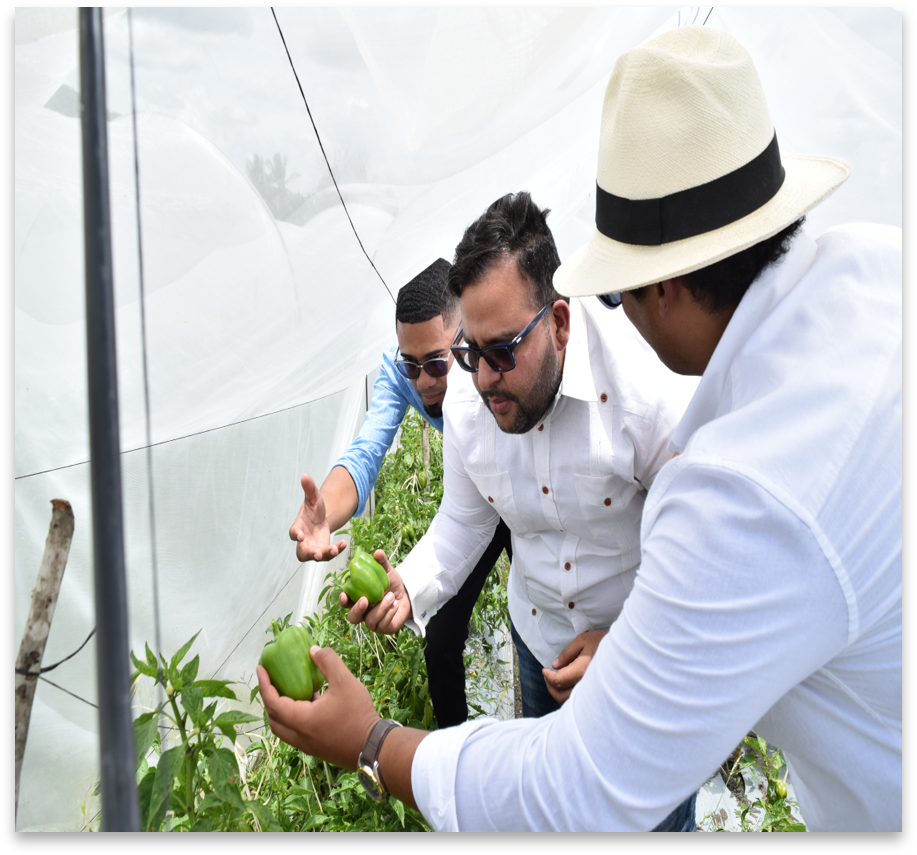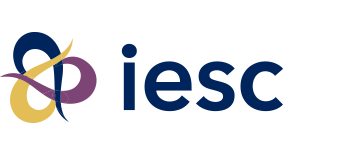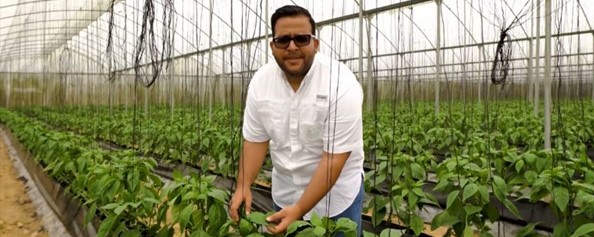Creating a Culture of Food Safety Among Packinghouses and Producers
Farmer Field Schools Promote Successful Application of Food Safety Knowledge

Luis Peña exhibiting the freshness of his bell pepper crops.
P&T Valley Farms is a newly established family-owned company in the Dominican Republic (DR) located near the border with Haiti. Managed by Luis Peña, the company’s business plan is to switch from traditional crops such as onions and rice for the domestic market to greenhouse and field-grown bell peppers for export to the U.S. Bell peppers from the DR are in high demand by the U.S. market because of their large size and thick skins. Adherence to the Food & Drug Administration’s (FDA) Food Safety Modernization Act (FSMA) Produce Safety rule is a requirement for these bell peppers to enter the U.S.
A key priority of the USDA-funded and IESC-implemented TraSa project’s FSMA Ready Packinghouse program is strengthening the relationships between packinghouses and their satellite growers. Packinghouses typically process their own fruit and vegetables as well as the produce from associated growers. The packinghouse is therefore accountable for the food safety behavior of the producers from which they source their fruits and vegetables. To help P&T Valley Farms comply with the Produce Safety Rule, IESC helped Luis Peña develop a comprehensive food safety plan for P&T Valley Farms and its growers with the assistance of a FSMA Preventive Controls Qualified Individual (PCQI). As part of that plan, IESC trained a core group of 22 associated growers on the FSMA Produce Safety rule.
The FSMA Produce Safety Rule requirements dictate that ‘at least one supervisor or responsible party from each farm must have successfully completed food safety training at least equivalent to that received under standardized curriculum recognized as adequate by the Food and Drug Administration.’ The Produce Safety Alliance (PSA) Grower Training Course is one way to satisfy that requirement. However, since food safety knowledge does not necessarily translate into enhanced food safety application, IESC employed the Farmer Field School model to ensure course content was delivered and applied effectively. Farmer Field Schools are an adult education, vertical learning methodology that promote learning through discovery. Farmer Field Schools have proven to be an effective way of promoting a food safety culture in which producers are applying what they’ve learned, resulting in improved food quality and safety for consumers.
The TraSa supported P&T Valley Farms Farmer Field School met once a week for seven weeks and covered the following FSMA Produce Safety rule modules: Introduction to Produce Safety; Worker Health, Hygiene, and Training; Soil Amendments; Wildlife, Domesticated Animals, and Land Use; Agricultural Water; Postharvest Handling; and How to Develop a Farm Food Safety Plan.
At the graduation event, grower Juan Sánchez expressed the following about his participation: “I can’t believe that we didn’t adversely harm someone in the past after consuming our vegetables. At the Farmer Field School, we learned about the importance of knowing and respecting the pesticide application/harvest intervals for the safety of the consumers of our vegetables. We used to apply pesticides even up to the day before harvest! Now we understand that the type, amount, and when we apply pesticides is critical from a food safety and environmental protection standpoint.”
This statement demonstrates how IESC is creating a lasting culture around food safety in the Dominican Republic. As a result of the Farmer Field School, knowledge of the FSMA Produce Safety Rule increased by 68% among training participants.
Trade Safe (TraSa) is a USDA Food for Progress initiative in the Dominican Republic implemented by IESC. TraSa is improving the efficiency, coordination, and transparency of the trade, commercialization, and safety of food and agricultural products by supporting the implementation of science and risk-based sanitary and phytosanitary measures, standards, and regulations. The Project is expanding the DR’s local, regional, and international trade in agricultural products, increasing agricultural productivity, and improving consumer access to safe foods. IESC is joined by Purdue University, the Global Cold Chain Alliance-World Food Logistics Organization (GCCA-WFLO), LixCap, and the DR-based Center for Agricultural and Forestry Development (CEDAF) in the implementation of the TraSa Project.




